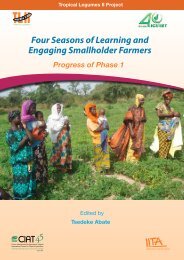Four Seasons of Learning and Engaging Smallholder Farmers - icrisat
Four Seasons of Learning and Engaging Smallholder Farmers - icrisat
Four Seasons of Learning and Engaging Smallholder Farmers - icrisat
Create successful ePaper yourself
Turn your PDF publications into a flip-book with our unique Google optimized e-Paper software.
The up-scaling program signals the public sector efforts to improve the production <strong>and</strong><br />
distribution <strong>of</strong> basic seed <strong>of</strong> soybean. As opposed to past basic seed production initiatives, the<br />
up-scaling program is more organized. For instance, the varieties that are multiplied under this<br />
program are chosen based on farmer <strong>and</strong> consumer preferences <strong>and</strong> the seed production is<br />
undertaken by farmers with inspection <strong>and</strong> other technical support from the Seed Services Unit.<br />
Certified seed production <strong>and</strong> dem<strong>and</strong> in Malawi<br />
Production <strong>of</strong> soybean seed is concentrated in the main soybean producing areas <strong>of</strong> Lilongwe, Kasungu,<br />
<strong>and</strong> Mzuzu. The main actors in soybean seed production in Malawi are the Association <strong>of</strong> Small-<br />
Scale Seed Multipliers Action Groups (ASSMAG) <strong>and</strong> SeedCo. ASSMAG is a farmer-owned rural seed<br />
production <strong>and</strong> marketing organization in Malawi <strong>and</strong> was formed in 2001 as a successor to the National<br />
<strong>Smallholder</strong> Seed Producer Association (NASSPA). All certified seed produced under ASSMAG is bulked<br />
<strong>and</strong> sold to NGOs (World Vision International-Malawi, Action Relief, Christian Health Association <strong>of</strong><br />
Malawi, Catholic Development Commission <strong>of</strong> Malawi) that either distribute it for free or under a<br />
revolving credit scheme. The main soybean seed producing associations are Mzuzu, Bua, <strong>and</strong> Chigwa<br />
in Mzuzu, Kasungu, <strong>and</strong> Salima Agricultural Development Divisions (ADDs), respectively. In 2007,<br />
ASSMAG accounted for 95% <strong>of</strong> total certified soybean seed production in Malawi. On the other h<strong>and</strong>,<br />
SeedCo is a private seed company that is involved in production <strong>and</strong> distribution <strong>of</strong> soybean seed<br />
in Malawi—registered in 1999 <strong>and</strong> started operations in 2000. The company produces seed <strong>of</strong> two<br />
varieties (Soprano <strong>and</strong> Solitaire). These varieties were developed by SeedCo–Zimbabwe <strong>and</strong> released in<br />
Malawi in August 2003. SeedCo produced about 111 MT in 2005 <strong>and</strong> 300 MT in 2006—both through<br />
its out-growers. In 2006, SeedCo accounted for about 50% <strong>of</strong> total soybean seed production in Malawi.<br />
Figure 11-3: Soybean seed production in Malawi, 2000–2007<br />
Soybean seed production in Malawi has exhibited significant fluctuation over the period 2000–2007<br />
(Figure 11-3). Production increased from only 122 MT in 2000 to 767 MT in 2001, but then declined<br />
sharply to almost 50 MT in 2003. The sharp increase in seed production in 2001 was largely due largely<br />
to: (1) community-based seed production initiatives involving NASSPA with funding from foreign<br />
sources (e.g., European Union), <strong>and</strong> (2) seed production by Monsanto.<br />
Seed systems in Mozambique<br />
Soybean seed multiplication is solely undertaken by community-based associations that are members<br />
<strong>of</strong> IKURU. IKURU is a farmer-owned commercial entity that works with local out grower associations<br />
for cowpea <strong>and</strong> soybean in Nampula <strong>and</strong> Zambezia. It procures basic seed <strong>of</strong> cowpea—mainly IT-<br />
18—from the Basic Seed Unit <strong>of</strong> IIAM (USEBA) <strong>and</strong> basic seed <strong>of</strong> soybean—mainly Santa Rosa <strong>and</strong><br />
224<br />
<strong>Engaging</strong> <strong>Smallholder</strong> <strong>Farmers</strong> | Tropical Legumes II Project

















